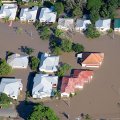A modelling study from an international collaboration involving German, Canadian and Australian scientists has concluded that increasing global temperatures to 2 degrees above pre-industrial global temperatures will be too hot for two thirds of the world’s corals and hence coral reefs.
The study published in international journal Nature Climate Change today reveals that only strong action to mitigate greenhouse-gas emissions plus an assumed ability to rapidly evolve will save some coral reefs.
Not taking strong steps to mitigate carbon dioxide, however, is certain to destine most coral reefs to loss by mid to late century.
Coral reefs are the most biologically diverse ecosystems on the planet and provide critical services such as coastal protection, tourism and food to hundreds of millions of people worldwide.
Global warming and ocean acidification, both driven by human-caused CO2 emissions, pose a major threat to these important marine ecosystems.
“Our findings show that under current assumptions regarding thermal sensitivity, coral reefs will no longer be prominent coastal ecosystems if global mean temperatures reach 2°C above the pre-industrial temperatures,” lead author Dr Katja Frieler from the Potsdam Institute for Climate Impact Research, said.
“This research uses some of the most up-to-date models and sophisticated tools available,” said Professor Ove Hoegh-Guldberg, from the Global Change Institute and ARC Centre for Excellence for Coral Reef Studies at The University of Queensland.
“The project results are of great concern.
"For a long while, we thought that coral reefs would be safe up to 2°C higher in average global temperature but our research shows that this is no longer true.”
The study involved scientists from Potsdam, the University of British Columbia in Canada and the Universities of Melbourne and Queensland in Australia.
To project the cumulative heat stress at 2160 reef locations worldwide, they used an extensive set of 19 global climate models.
By applying different emission scenarios covering the 21st century and multiple climate model simulations, a total of more than 32,000 simulation years was diagnosed.
This allows for a more robust representation of uncertainty than any previous study.
Corals might be okay if they were able to adapt to the changes through rapid evolution.
“This is an extremely optimistic scenario which has little direct support,” Professor Hoegh-Guldberg said.
“Corals also have long generation times that may range from 5 to hundreds of years, and often show low levels of genetic diversity.
"These features of their life cycle militate against rapid evolution.
"They are not like fruit flies or bacteria which have much shorter generation times and consequently can evolve much faster.”
Lead author, Dr Frieler was also doubtful of this possibility and said: “Without the uncertain process of adaptation or acclimation, about 70 per cent of corals are projected to suffer from long-term degradation by 2030 even under an ambitious mitigation scenario.”
The authors have concluded on the basis of this information that the thermal threshold required to protect at least half of the coral reefs worldwide is estimated to lie at or below a 1.5°C mean increase in global average temperature.
Corals derive most of their energy from a close symbiotic relationship with tiny plant-like organisms known as zooxanthellae.
Under environmental stresses such as sudden increases in sea temperature, this critically important symbiosis breaks down and the brown symbionts are lost from the tissues of the coral.
This can cause large numbers of corals to take on a brilliant white colour over a few days; referred to as ‘mass coral bleaching’.
First reported in 1979, coral bleaching has become more frequent and intense across the planet, and has often been followed by mass mortality events across tens of thousands of square kilometres of coral reef.
“Coral bleaching has the coral reef expert community very worried," Professor Hoegh-Guldberg said.
"The impacts are already major.
"In the warm year of 1998, 16 per cent of the world's corals disappeared from reefs all over the world.
“In some locations - such as the Western Indian Ocean and islands off North-West Australia - reefs lost as much as 50-80 per cent of their corals in this disastrous year-long event.”
The paper also investigates what would happen if the susceptibility of corals to thermal stress increased as a result of other factors such as ocean acidification and pollution.
Ocean acidification is a consequence of the increasing amount of carbon dioxide entering the world oceans.
“Recent studies have indicated that the sensitivity of corals to thermal stress increases when they are exposed to acidified conditions” Professor Hoegh-Guldberg said.
“This has serious implications, including the possibility that current assumptions about the thermal sensitivity might underestimate, not overestimate, the future impact of climate change on corals.”
This comprehensive analysis highlighted how close we are to a world without coral reefs.
“The window of opportunity to preserve the majority of coral reefs, part of the world’s natural heritage, is small,” said Malte Meinshausen, co-author at the Potsdam Institute for Climate Impact Research and the University of Melbourne.
“We close this window, if we follow another decade of ballooning global greenhouse-gas emissions.”
Article: Frieler, K., Meinshausen, M., Golly, A., Mengel, M., Lebek, K., Donner, S., Hoegh-Guldberg, O. (2012): Limiting global warming to 2°C is unlikely to save most coral reefs. Nature Climate Change [DOI: 10.1038/NCLIMATE1674] (Advance Online Publication)
Weblink to the article: http://dx.doi.org/10.1038/NCLIMATE1674
.jpg)










